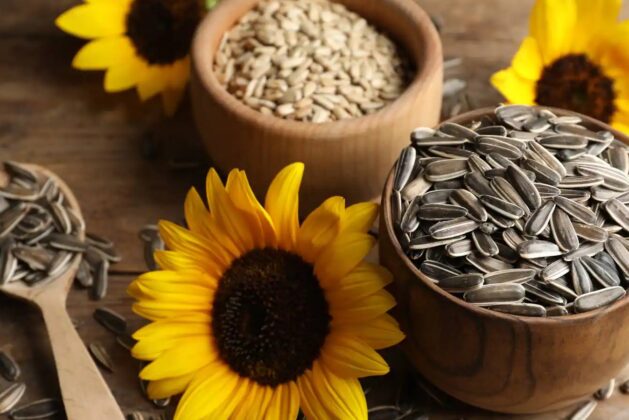[ad_1]
Sunflower oil has been used in food for centuries. Grind the seeds to obtain oil. But you know that sunflower seeds are more beneficial than sunflower oil, and you can snack on them! Studies have shown that these seeds are rich in vitamin E. The best part is that they contain zero cholesterol. In this way, they control blood pressure and help maintain heart health. Let us know the health benefits of sunflower seeds.
So let’s take a look at these benefits of sunflower seeds, which are rich in health properties.
Sunflower seeds are special
There is a flower that follows the movement of the sun. Also known as heliotropism. Sunflower oil has been widely used. But today we’re talking about sunflower seeds.
Here comes the 2017 NCBI Sunflower- Sunflower (Helianthus annuus L.).According to a Sunflower seeds provide a variety of health benefits. They can aid in weight loss and maintain hormonal balance in women and men. These seeds can also protect you from heart disease and metabolic disorders.
1. Lowers Cholesterol Levels
According to a 2012 study by the Department of Nutrition and Dietetics on the nutritional and therapeutic potential of sunflower seeds Sunflower seeds can affect metabolism and accumulation processes because they are rich in monounsaturated and polyunsaturated fatty acids.
Saturated fats are found in butter, margarine, lard, and shortening. When you replace saturated fat with unsaturated fat, your cholesterol levels may drop.

Sunflower seeds can lower bad cholesterol (LDL) in serum. Eating them will also make you feel full. This is because they are high in calories. Eating sunflower seeds can fill you up, so avoid foods high in cholesterol. Plus, lowering cholesterol levels is good for your heart!
2. Keep your heart healthy
Studies have shown that sunflower seeds can help control blood cholesterol levels. Lower cholesterol levels mean a lower risk of atherosclerosis and other heart diseases. Sunflower seeds also have antihypertensive effects.
These seeds contain specific proteins, vitamin E, and phytochemicals like helianthin, which can eliminate free radicals in the blood. The proteins found in these, such as pepsin and pancreatin, also inhibit angiotensin-I converting enzyme (ACE). It is a vasoconstrictor, which means it constricts blood vessels, which increases blood pressure.
3. Has anti-inflammatory properties
Sunflower and its oils and seeds are known for their anti-inflammatory properties because they contain active tocopherols (vitamin E), linoleic acid, linolenic acid, triterpenes, and various polyphenolic compounds.
Flowers, seeds, and seed oils may also have positive effects on inflammatory diseases. These include diabetes, arthritis, memory loss, gout and cirrhosis.
High sugar levels can trigger inflammation. Fortunately, sunflower seeds are rich in dietary fiber, which slows the absorption of nutrients from food and prevents sugar buildup after meals.
Does this mean that sunflower seeds have a lower glycemic index (GI)? Let’s find out.
4. Good breakfast for diabetics
If you believe the thugs mentioned in this study, many health care providers suggest that diabetes can be managed by eating the right foods. Eating high-sugar, high-carb foods can increase the amount of sugar in your blood. If you’re already battling diabetes, it’s going to get worse.

Eating low-cholesterol and low-GI foods like sunflower seeds can help you manage your diabetes. The glycemic index of sunflower seeds is about 20. Eating these along with pumpkin seeds can prevent your blood sugar levels from rising (hyperglycemia).
Unsaturated fatty acids and polyphenolic compounds in sunflower seeds also have antidiabetic effects. By controlling your blood sugar levels, you’re also indirectly protecting your liver, pancreas, and other vital organs.
5. Reduce Constipation and Diarrhea
High-fiber foods like sunflower seeds, pecans, walnuts, pumpkin seeds, soy nuts, and other nuts/seeds can act as laxatives to help relieve constipation.
You can eat them on their own or add them to smoothies, breakfast cereal, or yogurt. However, make sure you only consume 20-35 grams of these nuts and seeds per day. Too much or too little fiber in these seed forms can worsen constipation or diarrhea.
The anti-inflammatory properties of sunflower seeds may provide relief from irritable bowel syndrome (IBS). But remember, drink water with them too. Without water, seed fiber can do more harm than good.
6. Controls estrogen imbalances
Sunflower seeds are one of the richest sources of phytoestrogens. Phytoestrogens are plant metabolites. These phytochemicals are structurally and functionally similar to hormones, especially estrogen and testosterone.
ALSO READ: Tired of eating curds with regular cumin, try Carrot Raita this time in Navratri
[ad_2]



Leave a comment